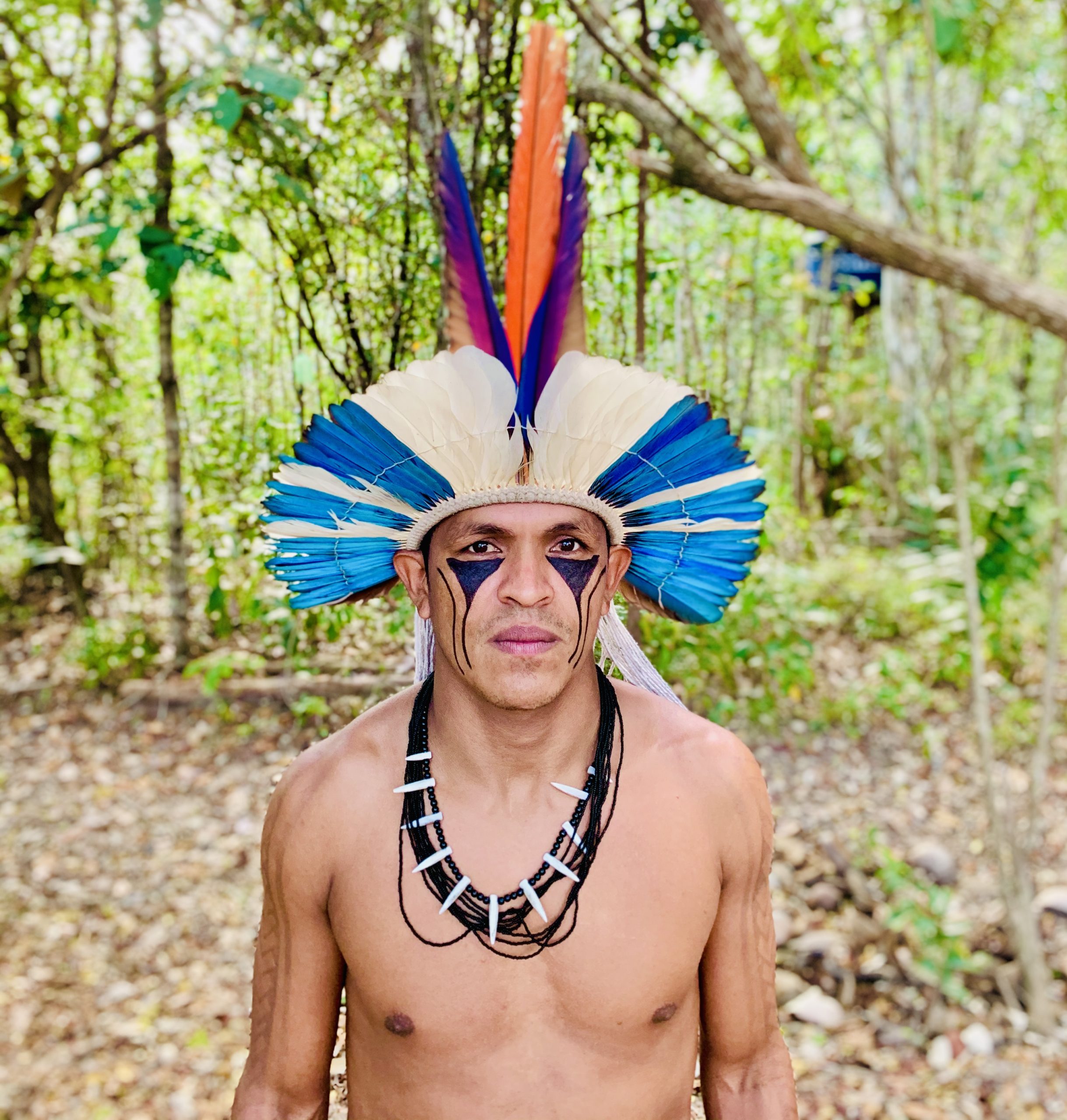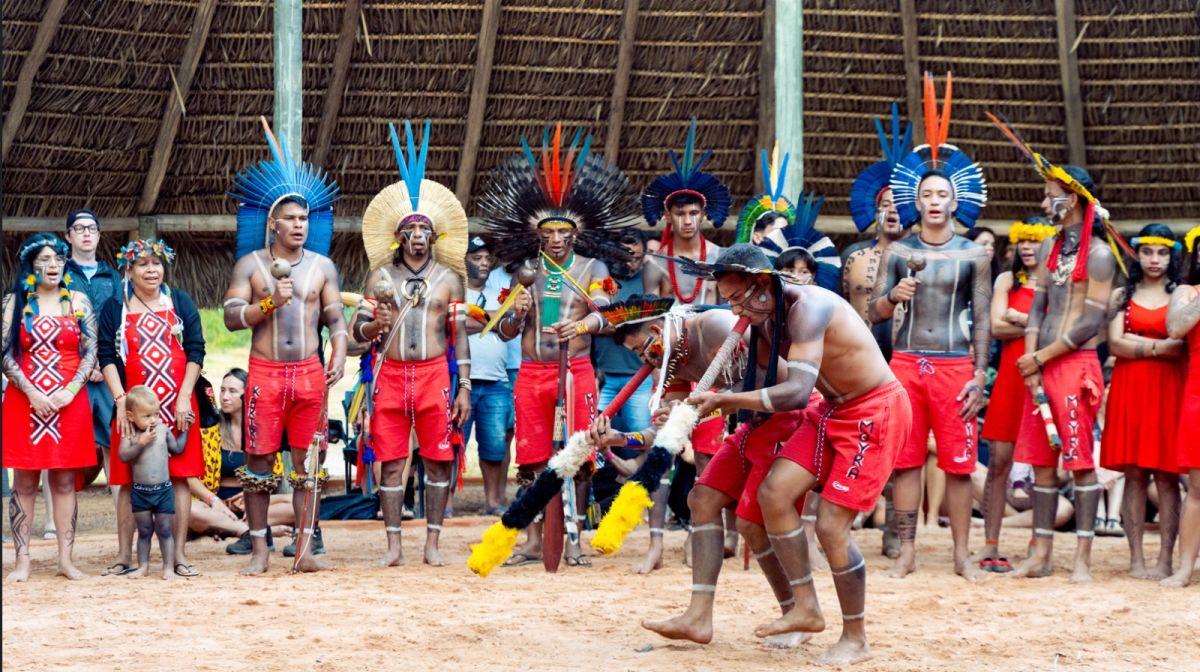Kariri-Xocó Tribe – Bahia Brazil
 The Kariri-Xocó are an indigenous people from the northeastern region of Brazil, primarily in the states of Alagoas and Bahia. They are part of the Kariri group, which historically inhabited a broader area of northeastern Brazil, and are considered part of the larger Tupi-Guarani language family. The term Kariri-Xocó refers to the union of two distinct groups: the Kariri and the Xocó. This amalgamation has led to a unique cultural identity that blends the traditions and practices of both groups.
The Kariri-Xocó are an indigenous people from the northeastern region of Brazil, primarily in the states of Alagoas and Bahia. They are part of the Kariri group, which historically inhabited a broader area of northeastern Brazil, and are considered part of the larger Tupi-Guarani language family. The term Kariri-Xocó refers to the union of two distinct groups: the Kariri and the Xocó. This amalgamation has led to a unique cultural identity that blends the traditions and practices of both groups.
The Kariri-Xocó community today is a resilient and vital indigenous group that continues to protect its cultural heritage while engaging with modern political and social challenges.
Historical Context:
- Pre-Colonial Era: Like many indigenous peoples in Brazil, the Kariri-Xocó had their own distinct culture, language, and way of life long before European colonization. They were part of the larger Tupi-Guarani cultural and linguistic family, and their ancestors likely lived in the coastal and inland areas of Bahia and Alagoas for centuries.
- Colonization: The arrival of the Portuguese in Brazil in the 16th century brought profound changes to indigenous peoples, including the Kariri-Xocó. They faced forced labor, disease, and the displacement of their traditional lands. Despite these pressures, they managed to preserve many aspects of their cultural identity.
- Post-Colonial and Modern Times: Like other indigenous groups in Brazil, the Kariri-Xocó faced pressures to assimilate into mainstream Brazilian society, particularly during the 19th and 20th centuries. However, they have continued to maintain their traditions, language, and customs, fighting to preserve their heritage and land.
Language:
- The Xocó language belongs to the Tupi-Guarani language family. It is an endangered language, with only a few fluent speakers remaining, and efforts are being made to revitalize and preserve it among younger generations.
- Many Kariri-Xocó people also speak Portuguese, the national language of Brazil, which has contributed to the decline of their native language, as is the case with many indigenous languages across the country.

Photo by Priscila Tapajowara (@priscilatapajowara on Instagram)
Culture and Traditions:
- Spirituality: The Kariri-Xocó people have a deep connection to nature and spirituality, which plays an important role in their community life. Many of their ceremonies and rituals involve music, dance, and the use of traditional medicines.
- Ceremonies: They perform rituals that are rooted in their ancestral worship, which often involves songs, dances, and participation in communal activities. These ceremonies are integral to their cultural identity, and they are important for the social and spiritual cohesion of the group.
- Handicrafts and Arts: The Kariri-Xocó people are known for their weaving, pottery, and other traditional crafts. These arts are both a way of preserving cultural practices and a source of economic livelihood for some members of the community.
- Traditional Healing: Like many indigenous peoples, the Kariri-Xocó use plant-based remedies and traditional medicine passed down through generations. Healers in the community use knowledge of medicinal plants to treat various ailments.
Current Challenges:
- Land Rights and Environmental Threats: Like many indigenous groups in Brazil, the Kariri-Xocó face challenges related to land rights, with their ancestral lands being threatened by deforestation, agricultural expansion, and urbanization. They have been involved in political and legal battles to protect their land and ensure access to natural resources.
- Cultural Preservation: The Kariri-Xocó are engaged in efforts to preserve their cultural identity, including their language, arts, and spiritual practices. This includes initiatives to teach younger generations their native tongue and to organize cultural festivals and ceremonies.
- Political Advocacy: The Kariri-Xocó have become involved in broader indigenous rights movements in Brazil, advocating for the recognition of their land, culture, and identity. They have worked alongside other indigenous groups in the country to address issues of discrimination, inequality, and land encroachment.
Recognition and Indigenous Rights:
- Over the years, the Kariri-Xocó have gained recognition from the Brazilian government as an official indigenous group. In the 1980s and 1990s, they made significant strides in securing land rights and recognition from FUNAI(the Brazilian National Indian Foundation).
- The Kariri-Xocó have also become increasingly involved in advocacy efforts through indigenous councils and NGOs, fighting for better health care, education, and political representation for their community.
Modern Day Kariri-Xocó:
- Today, the Kariri-Xocó people continue to live in their ancestral territories in Bahia and Alagoas, and many continue to practice a mix of traditional ways of life and modern Brazilian culture.
- Their fight for land rights and cultural preservation continues, as they seek to protect their territories from external threats like logging, agribusiness expansion, and mining.
- The community is actively working to maintain and pass on their culture and traditions to younger generations, while also engaging with broader indigenous movements in Brazil and internationally.
Conclusion:
In summary, the Kariri-Xocó are a proud and resilient indigenous group with a rich cultural heritage and a deep connection to their ancestral lands. Despite challenges, they continue to fight for their rights, preserve their traditions, and assert their identity within the broader Brazilian society.

